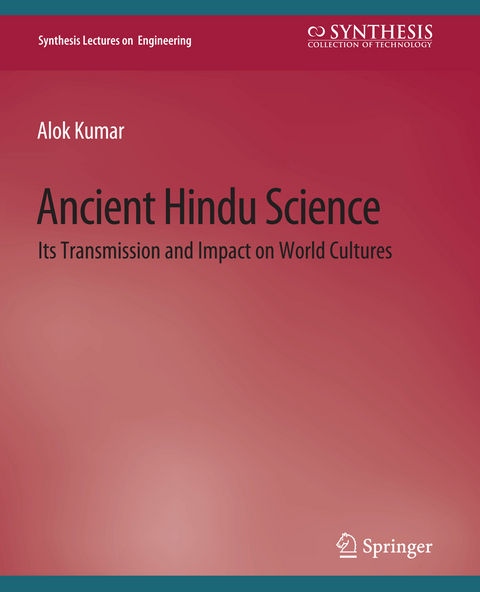
Ancient Hindu Science
Springer International Publishing (Verlag)
978-3-031-79401-8 (ISBN)
Alok Kumar is a Distinguished Teaching Professor of physics at the State University of New York at Oswego. He was born and educated in India. Later, he taught at California State University at Long Beach and received the Meritorious Performance and Professional Promise Award for excellence in teaching and research in 1990. He has been teaching in the American higher education for about four decades. In Oswego, Kumar has received the Chancellor's Award for Excellence in Teaching, a lifetime SUNY award, in 1997 and the President Award for Creative and Scholarly Activity or Research, a lifetime award, in 2002. He is a fellow of the Alexander von Humboldt Foundation, Germany, and a NOVA/NASA fellow. Kumar is active in the fields of atomic physics, chemical physics, history of science, and science education. He has about 75 peer-reviewed publications, and has authored/coauthored three books:(1) Science in the Medieval World, (2) Sciences of the Ancient Hindus: Unlocking Nature in the Pursuit of Salvation, and (3) A History of Science in World Cultures: Voices of Knowledge. All three books deal with the cultural heritage studies in science, including the non-Western cultures. Kumar believes that, to understand modern science, it is essential to recognize that many of the most fundamental scientific principles are drawn from knowledge amassed by ancient civilizations. Kumar strongly believes that, in a gadget-filled world, scientific literacy is becoming an essential requirement for everyday life. It is the duty of a scientist to disseminate scientific knowledge to the general public. He has done so through articles and interviews in the popular media, making documentary films on archaeological sites that are rich in science, offering institutes for the underprivileged and underrepresented middle school students to pursue a career in science and technology, and lecturing about science for the general public. There are about 120 articles/reports about his activities in the popular media. This includes press releases from Reuters,the Press Trust of India, articles in The Washington Post, Family Life, The Scientists, The Post Standard, The Palladium Times, India Abroad, India West, The South Asian Times, Hinduism Today, AramcoWorld, Organiser, and radio interviews.
Preface.- Acknowledgments.- Introduction.- The Building Blocks of Science.- The Hindu Mathematics.- Astronomy.- Physics.- Chemistry.- Biology.- Medicine.- The Global Impact.- Bibliography.- Author's Biography.- Index.
| Erscheinungsdatum | 06.06.2022 |
|---|---|
| Reihe/Serie | Synthesis Lectures on Engineering | Synthesis Lectures on Engineering, Science, and Technology |
| Zusatzinfo | XIV, 197 p. |
| Verlagsort | Cham |
| Sprache | englisch |
| Maße | 191 x 235 mm |
| Gewicht | 408 g |
| Themenwelt | Sozialwissenschaften ► Pädagogik ► Berufspädagogik |
| Technik ► Maschinenbau | |
| ISBN-10 | 3-031-79401-X / 303179401X |
| ISBN-13 | 978-3-031-79401-8 / 9783031794018 |
| Zustand | Neuware |
| Informationen gemäß Produktsicherheitsverordnung (GPSR) | |
| Haben Sie eine Frage zum Produkt? |
aus dem Bereich


